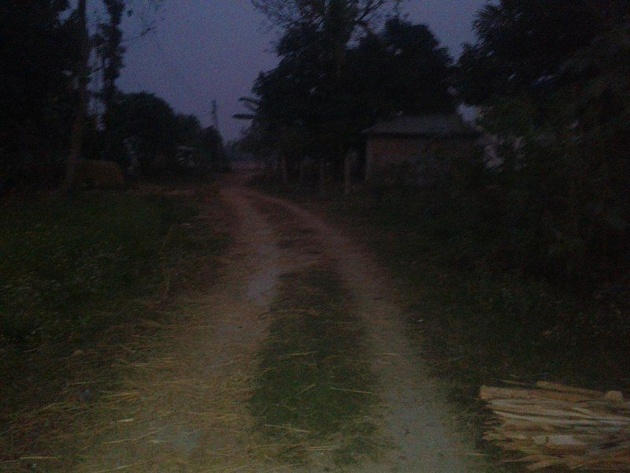In the western hemisphere, there is a chain of islands that provide a loose link between North and South America. The islands in this chain, though small in size, are rich in culture and tradition. During my time on Bitlander, I will endeavor to share stories of the culture and traditions from all over the world that have been mixed together to shape and define customs, beliefs and general ways of life in the cosmopolitan melting pot that is the Caribbean. I'll start with the islands of Trinidad and Tobago, but before I get to my story, why not check out this little tidbit from the Querlo chat?
Did you know of the Ceiba tree?
The tree is commonly known as the silk-cotton tree in the Caribbean.

Photo by P. L. Tandon on Flickr
Among Amerindians and West Africans, the ceiba tree was traditionally believed to be the benevolent home of ancestral spirits, but over the course of colonization, this tree became a site to be feared, a site where "jumbies" or evil spirits roamed, a site to be avoided and many superstitious tales were told about the ceiba tree deterring even the most bold adventurer.
The bundle that was too heavy to carry is an anecdote that has been passed down from generation to generation mixing the bastardization of the earlier and purer West African and Amerindian beliefs and cultures to come up with an anecdote that is as chilly in places as it is entertaining.
Here the storyteller is king
It might be an unimaginable period, the age before electricity and technology, but in that era, the storyteller was king, for he could tell stories that would inform, educate and entertain the nobility and commoners alike. He made his trade from gathering and weaving together rich stories that could come to life in the imagination of the listeneres, and no two listeners could perceive the exact same story the same way, for each character took a different shape in their mineds. The storyteller was a very powerful person indeed.
And so, this evening, let us join our storyteller on a root of the ceiba tree as the rays of the day fade away. The night is coming swiftly and we have lodged a flambeau (flaming torch) in the rich black earth at our feet, just enough to throw our faces into silhouette, to make our eyes seem larges, our voices more hollow. Come sit with us on the edge of the forest where there are no artificial lights to obscure the night sky.

Photo Credit George Hodan on PublicDomainPictures.net
Sit and listen as the bats fly, their wings hitting the branches of the trees; as the trees whisper to each other; sit and listen as the wind sings. Picture yourself, a child, huddled close to your siblings, shivering and not quite certain whether it is the deep timbre of the storyteller's voice an the wide-eyes staring at you through the gloom that is making you shake or whether it is just the wind licking at your skin as if to let you know that maybe, just maybe the ceiba spirits are listening in on this one.
The bundle that was too heavy to carry
And this is how the story unfolds...
Once there was a man who was a very hard worker. He worked all day from sun-up to sun-down on the plantation. He would weed, he would clear rubble, he would tend to the farmer, he would do all the jobs required around the main house. This man was a hard worker. And on evenings when there was little light, just like it is now (and you picture the gathering dusk) he would take his leave from the main house and walk for miles until evening turned to night, until the soles of his feet were sore, and when he felt like he could walk no more, he would spy his tiny little home in the hills outside the city. He would see the light flickering in the window of his home and he would smile for he would know that his wife was there and that she would have prepared for him a hot bowl of porridge to warm his bones.

Photo Credit: Wikimedia Commons
One evening, during the midst of harvest, when the days were long and the work particularly hard, this man put down his tools at the end of the day and prepared to make his daily trek home. He was tired. He yearned for the warmth of the crocus bag spread on the floor of his home to serve as his bed. And so, caught up in thoughts of his wife, his porridge and his bed, this man decided that he would take a short cut home.
There was a wide stretch of land that separated the wealthy home of his employer from his home on the hill.

Photo Credit Wikimedia Commons
Most days, the man would avoid this stretch of land, for almost at the center of it grew a silk cotton (ceiba) tree and this was the place where the spirits of the dead and jumbies roamed. But on the day in question, the man was exhausted and he could not walk for miles and miles simply to avoid one tree.
So he thought, "What's the worst that could happen?" And he set off whistling across the stretch of land.
Almost immediately, the place became darker and wind fingers started creeping up the back of his neck. But the man didn't look back, because if he did, a jumbie would steal his eyes. So he kept walking. The wind grew louder, crying, but he didn't sing to soothe her, for he knew if he did, a jumbie would steal his voice. He kept walking.
The place became colder, dropping several degrees, but there was hardly anything he could do about that, so he kept on walking. He was almost upon the tree when he heard the baby.
"Waah! waah! waah!" The thin cries were coming from the roots of the ceiba tree.
The man hesitated. A baby is such an adorable thing to look at, even in the still of the night, even when buried amongst the roots of the ceiba tree... a seeming newborn left abandoned for the spirits of the dead. A baby is such an adorable thing to look at that the man's heart melted. He didn't want to leave an innocent child in the cold, dark night all alone. He was soft-hearted and he couldn't bear the thought of something happening to an infant because he was scared of some stupid story. So he trampled through the brushes, and sure enough a baby lay there, face screwed up, mouth open wide, arms and legs flailing as it screamed.
"Now who would bring a child here just like that?" The man wondered. But he knew that times were hard and things were difficult and that sometimes people did not want to raise a baby in beds made of crocus or they didn't want their children to grow up to work out on plantations, weeding and ploughing and planting and pruning and harvesting and clearing away debris and doing odd jobs from sunrise to sunset only so that they could afford a tiny room with a flambeau light and a crocus bed and thin rice and milk porridge without any bread for the rest of their lives. He hesitated.
"Well maybe I would just take the poor thing home," he said, thinking of his wife who could bear no children.
And he lifted the baby from the root of the tree, the tiny thing was small and as light as a feather, and he continued on his journey home. The baby, of course, nestled in his arms, stopped crying as the man whistled a merry tune.
The man had hardly walked for ten minutes when he observed that the baby had grown heavier. The child was now at least as heavy as a bowl of fruit.
"Must have been my imagination in the first place," he thought. "To expect that a child should be so light."
But he said nothing. He walked on for a few minutes and the child grew to be as heavy as a sackful of fruit, and then pretty soon it felt as though the man was carrying burden equal to or more than his own weight. He gasped and struggled to put one step infront of the other.
"I must be really exhausted," he thought. "But soon, I shall be home."
He had just spied the light in the window of his home and started to relax when the baby opened his mouth and began to talk. In a man's voice.
"Put me back where you get me," the voice was deep and harsh and malevolent. Stunned, the man looked around.
"Put me back where you get me," the baby chanted. And then it emitted a loud cackle, a diabolical cackle that made the man leap clear out of his skin.
You must picture here, a yawning mouth in a face illuminated by an unsteady flame, and a high-pitched cackle, one that starts so suddenly, you almost fall over in shock; a chilling laugh that echoes in the still night and sets the dogs to howling. But don't get carried away with your imaginings just yet because the storyteller is continuing and you must pay attention to know how this story ends.
The baby was now as heavy as two sacks full of potatos and as cold as a tomb on an October night.
"Who tell you pick me up? Am I your burden?" the baby that was not quite a baby asked.
Afraid to speak, the man shook his head.
"Well put me back where you get me."
Without arguing and forgetting that he was tired in the first place, the man turned right around and sprinted to the shade of the silk cotton tree for which he now had a healthy fear. As he drew closer, the baby began to lose weight again, becoming only as heavy as a bowl of fruit and then as light as a feather nestled in his arms.
The man deposited the baby as carefully as he could back amongst the roots of the tree. Once the baby was secure, he stood up, turned tail and ran all the way home as fast as his legs would carry him.
When he got home, gasping for breath, he was careful to wipe the dust off his feet, make the sign of the cross and turn around at the entrance of his home so that he could walk in backwards, thus preventing roaming spirits from following him inside. And when he was inside the haven of the one-roomed hut that smelled like tallow and candle grease, he threw himself shivering on the wooden stump that served as a bench.
The man's wife was alarmed.
"But is what have you coming home late like this, and then bursting through the door like the devil on your heels so?" she asked.
The man cast his eyes out the window of the house, staring into the blackness of the night as he recalled the chortling that followed him as he ran from the tree.
"Can't talk about it tonight wife," he said ominously. "The walls have ears and spiders carry tales, but I picked up a bundle tonight that wasn't mine and I was bringing it home here for you. It was a bundle that became too heavy to carry."
The wife nodded, for she knew all too well of the strange things that roamed at night. She didn't question her husband further, but served him a bowl of rice porridge and then sat down silently to look at him as he ate.
And that's the end of the first of my Caribbean tales, so in the tradition of the storyteller, I must end with...
Crick-Crack and Monkey break he back on a piece of pomerac.
Wire bend, story end.



